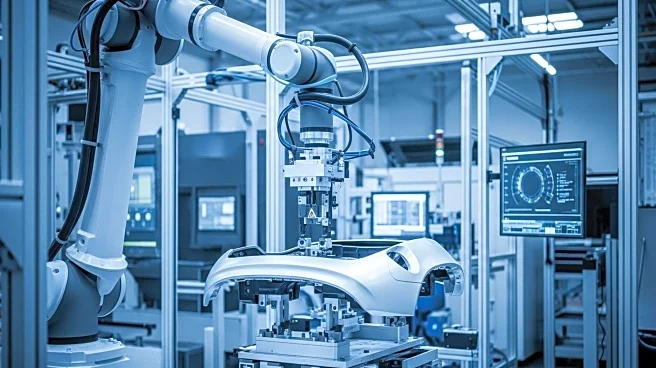What is the story about?
What's Happening?
Machina Labs has announced a new robotic approach to automotive body manufacturing that aims to bring customized vehicles to market at mass-production prices. The Los Angeles-based company, founded in 2019, is developing intelligent, adaptive, and software-driven factories. Their RoboCraftsman platform uses advanced robotics and AI-driven process controls to manufacture complex metal structures for aerospace, defense, and automotive applications. This approach eliminates the need for dedicated tooling per model variation, reducing project capital and storage needs, and enabling faster production changeovers. The company’s proprietary RoboForming technology allows for incremental sheet forming, delivering customized panels from sheet metal at high volume and quality with short lead times.
Why It's Important?
The integration of robotics and AI in manufacturing by Machina Labs represents a significant shift in the automotive industry, which traditionally relies on high-volume production with limited customization. This development could democratize vehicle customization, making it accessible to a broader market beyond luxury segments. The ability to produce bespoke products quickly and efficiently meets growing consumer demand for personalized vehicles. Additionally, the collaboration with Toyota Motor North America and investment from Woven Capital highlights the industry's interest in innovative manufacturing solutions that can enhance production efficiency and product differentiation.
What's Next?
Machina Labs plans to continue integrating its systems into automotive production over the next year, aiming to scale up to produce thousands of vehicles. The pilot project with Toyota will apply RoboForming technology to customize body panels, potentially setting a new standard for automotive-grade quality in low-volume manufacturing. As the company refines its processes, it could pave the way for widespread adoption of AI-powered manufacturing in the automotive sector, offering new opportunities for customization and personalization.
Beyond the Headlines
The shift towards AI-driven manufacturing could have broader implications for the industry, including changes in supply chain dynamics and manufacturing employment. As traditional manufacturing processes evolve, there may be a need for new skills and training programs to support the workforce in adapting to advanced technologies. Additionally, the environmental impact of reduced tooling and storage requirements could contribute to more sustainable manufacturing practices.















